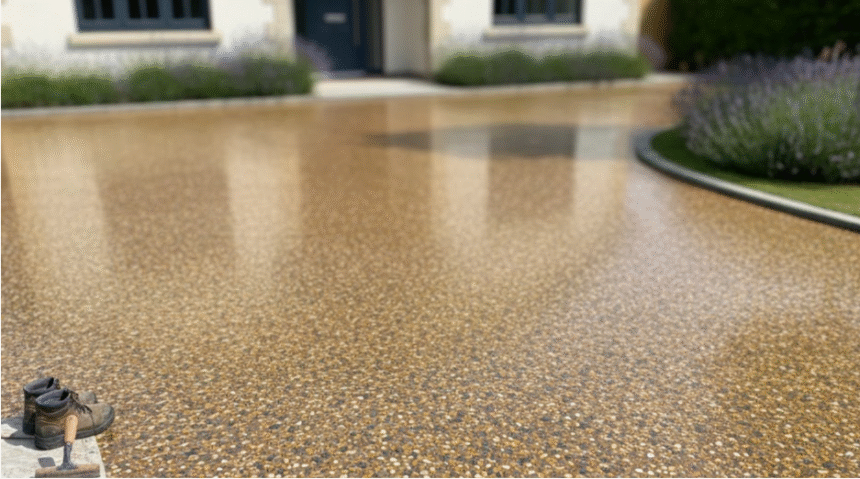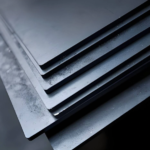Choosing between DIY and professional installation for your resin driveway can significantly impact its longevity and appearance. The key differences lie in expertise, cost considerations, and final quality outcomes.
While DIY approaches promise cost savings, professional installations deliver superior durability through proper groundwork, material quality, and technical know-how.
UK homeowners face unique challenges with weather conditions and drainage requirements that demand careful consideration. This article explores both options in depth, helping you make an informed decision that balances your budget with long-term value and performance expectations.
The Differences Between DIY vs Pro Resin Driveway in the UK
Understanding the fundamental differences between DIY and professional resin driveway installation helps UK homeowners make better choices. The gap between these two approaches extends beyond simple cost comparisons to include expertise levels, equipment requirements, and quality outcomes.
Expertise and Knowledge Levels
Professional installers possess specialized training and years of hands-on experience with resin-bound surfaces. They understand the precise mixing ratios between resin and aggregate, which typically require exact measurements to achieve optimal strength. DIY enthusiasts often lack this technical knowledge, leading to surfaces that may crack or deteriorate prematurely.
Experts also recognize how UK weather patterns affect installation timing and curing processes. Experienced resin bound driveways installers in Essex know when conditions are ideal for laying resin and can adjust techniques accordingly to ensure proper curing and long-lasting results.
Equipment and Material Quality
Professional teams invest in commercial-grade mixing equipment and specialized tools that ensure consistent results. These tools cost thousands of pounds, making them impractical for one-time DIY projects. High-quality UV-stable resin used by professionals resists fading and maintains colour integrity for decades.
DIY installers typically use cheaper alternatives or rent equipment that may not deliver the same level of precision. The difference in material quality becomes apparent within the first few years, with professional installations maintaining their appearance much longer.
Time Investment Requirements
A professional team can complete a standard driveway installation within two to three days. DIY projects often stretch over several weekends as homeowners learn techniques and troubleshoot problems. The learning curve involved in achieving proper surface preparation, mixing, and laying techniques adds considerable time to DIY projects.
Cost Analysis: DIY vs Professional Installation
Budget considerations play a central role in deciding between DIY and professional resin driveway installation. Breaking down the true costs reveals surprising insights about long-term value.
Upfront Financial Commitments
Professional installation costs range from £50 to £100 per square metre across the UK, with labour accounting for approximately 40% of total expenses. DIY approaches eliminate labour costs but require purchasing materials, tools, and equipment rentals. Material costs alone typically run between £30 and £50 per square metre for quality products.
Equipment rental fees, including mixers and compactors, add another £200 to £400 to DIY projects. First-time installers often purchase excess materials to account for mistakes, further increasing costs.
Hidden DIY Expenses
Many DIY projects encounter unexpected costs that erode initial savings. Common issues include purchasing additional resin due to incorrect mixing ratios or needing to rent equipment for longer periods. Mistakes during installation may require professional remediation, sometimes costing more than hiring experts initially.
Poor drainage planning can lead to pooling water that damages the surface, requiring costly repairs within months. These hidden expenses often bring total DIY costs closer to professional rates.
Long-Term Value Considerations
Professional installations typically last 15 to 25 years with minimal maintenance, while DIY surfaces may require repairs or replacement within 5 to 10 years. The extended lifespan of professionally installed driveways provides better value over time. Warranty coverage offered by professional installers protects your investment against defects and premature failure.
Properly installed resin driveways can increase property values by enhancing curb appeal and functionality. DIY installations lacking a professional finish may not deliver the same value boost when selling your home.
Technical Challenges in Resin Driveway Installation
Technical complexity separates successful resin driveway projects from failures. Several critical factors require precise execution regardless of who performs the work.
Ground Preparation Requirements
Adequate ground preparation forms the foundation for durable resin surfaces. Excavation depths typically reach 200 to 250mm to accommodate proper drainage and base layers. The existing surface must be thoroughly cleaned, levelled, and compacted before applying any resin mixture.
For permeable driveways, installers need porous sub-bases that allow water drainage while maintaining structural stability. Non-permeable installations can use existing concrete or tarmac if properly inspected and repaired. Inadequate preparation leads to cracking, sinking, and premature surface failure.
Mixing and Application Techniques
Achieving correct resin-to-aggregate ratios requires precision and experience. Professional installers know that resin must be laid at approximately 20 metres per hour to ensure proper curing before the mixture begins to set. Temperature and humidity affect working times, requiring real-time adjustments.
DIY installers often struggle with consistency, creating weak spots where too little resin was used or sticky areas with excess resin. Even application thickness across the entire surface prevents uneven wear patterns and maintains aesthetic appeal.
Drainage and Weather Considerations
UK weather demands careful attention to drainage planning during installation. Surfaces need proper grading to direct water away from buildings and prevent pooling. Resin installations require dry conditions and temperatures above 10 degrees Celsius for optimal curing.
Rain during or shortly after installation can damage uncured surfaces, causing surface detachment and discolouration. Professionals monitor weather forecasts and schedule work during favourable conditions, while DIY projects may proceed regardless of conditions.
Quality and Longevity Comparison
The quality difference between DIY and professional installations becomes increasingly evident over time. Several factors influence how well resin driveways perform throughout their lifespan.
Surface Finish and Appearance
Professional installations deliver seamless, smooth surfaces with consistent colour distribution and texture. Experts ensure proper edging that creates clean boundaries and prevents aggregate spillage. The visual appeal of professionally finished driveways significantly enhances property aesthetics.
DIY surfaces often display uneven textures, visible seams, or patchy colour distribution. These imperfections result from inconsistent mixing, rushed application, or inadequate smoothing techniques during installation.
Durability Under UK Conditions
Quality resin driveways withstand heavy vehicle traffic, temperature fluctuations, and harsh weather conditions common across the UK. Professional installations using UV-stable polyurethane resin resist fading, cracking, and degradation from sunlight exposure. The flexibility of properly mixed resin allows slight movement with ground shifts without cracking.
DIY installations using inferior materials or incorrect ratios may crack within the first winter freeze-thaw cycle. Poor bonding between resin and aggregate leads to loose stones and surface pitting that worsens rapidly.
Maintenance Requirements
Professionally installed resin driveways require minimal maintenance beyond occasional sweeping and pressure washing. The smooth, non-porous surface resists weed growth, oil stains, and moss accumulation. Annual maintenance costs remain low throughout the driveway’s lifespan.
DIY installations often need more frequent attention to address loose stones, cracks, or drainage issues. These ongoing maintenance demands increase lifetime costs and reduce the surface’s functional lifespan significantly.
When DIY Makes Sense vs Professional Installation
Certain situations favour DIY approaches while others clearly benefit from professional expertise. Understanding these scenarios helps homeowners make appropriate choices for their specific circumstances.
Suitable DIY Scenarios
Small projects like garden paths or patio areas under 20 square metres may suit experienced DIY enthusiasts with proper research and preparation. Homeowners with construction or paving experience possess transferable skills that improve success chances. Projects with flexible timelines, allowing proper learning and careful execution, work better for DIY attempts.
Budget-constrained situations where immediate cost savings outweigh long-term considerations might justify DIY approaches. However, homeowners must realistically assess their skill levels and time availability before committing.
When Professionals Are Essential
Main driveways requiring large surface areas demand professional installation to ensure consistency and quality. Properties with complex drainage requirements, sloped surfaces, or challenging access need expert assessment and execution. When seeking professional results for resin bound driveways installers in Essex or resin bound driveways installers in Hertford, they can provide the specialized expertise necessary for complex installations.
Homeowners lacking construction experience should avoid DIY attempts on primary driveways. The risk of costly mistakes far exceeds potential savings. Properties being prepared for sale benefit from professional installations that maximize curb appeal and property value.
Hybrid Approaches
Some homeowners successfully combine DIY and professional services by hiring experts for critical stages like ground preparation and base laying. They then attempt the resin application themselves under professional guidance. This approach reduces labour costs while ensuring proper foundation work.
Consulting with experienced installers before starting DIY projects provides valuable insights about material selection, technique, and timing. Professional advice helps avoid common mistakes that plague inexperienced installers.
Finding Quality Professional Installers
Selecting the right professional installer ensures your investment delivers expected results and longevity. Several factors help identify qualified contractors.
Credentials and Experience Verification
Reputable installers possess proper licensing, insurance coverage, and trade association memberships. Request examples of completed projects and contact previous clients about their experiences. Installers with 10 years or more of specific resin driveway experience demonstrate proven expertise.
Check for manufacturer certifications indicating approved training on specific resin products. These certifications ensure installers understand proper application techniques and material requirements.
Quote Comparison Strategies
Obtain detailed written quotes from at least three professional installers before making decisions. Compare not just prices but also material specifications, warranty terms, and project timelines. Extremely low quotes often indicate substandard materials or inexperienced contractors.
Ask specific questions about base preparation, drainage planning, and curing times. Quality installers provide comprehensive answers and explain their processes thoroughly. Vague responses or reluctance to discuss technical details raise red flags.
Warranty and Aftercare Considerations
Professional installations should include warranties covering workmanship for at least 10 years and material defects for similar periods. Understand what circumstances void warranties and what maintenance the installer recommends. Reputable contractors provide aftercare guidance and remain available for questions or concerns.
Written contracts should clearly specify all work included, materials used, project duration, and payment schedules. Avoid contractors demanding full payment upfront or offering cash-only discounts.
Frequently Asked Questions
How much does a resin driveway cost in the UK?
Professional resin driveway installation costs between £50 and £100 per square metre, depending on location, driveway size, and design complexity. A typical 40 square metre driveway ranges from £2,000 to £4,000 including materials and labour. DIY material costs run £30 to £50 per square metre but require additional tool purchases or rentals.
Prices vary across UK regions with higher rates in southeast England compared to northern areas. Additional costs may apply for significant groundwork, complex drainage systems, or decorative aggregate choices.
How long do resin driveways last?
Professionally installed resin driveways typically last 15 to 25 years with proper maintenance and quality materials. Lifespan depends on installation quality, material selection, drainage effectiveness, and traffic levels. UV-stable resins resist fading and maintain appearance throughout their lifespan.
DIY installations using inferior materials or improper techniques may only last 5 to 10 years before requiring significant repairs or replacement. Regular maintenance, including cleaning and addressing minor issues promptly extends driveway longevity regardless of installation method.
Make Your Decision Count
Choosing between DIY and professional resin driveway installation requires an honest assessment of your skills, available time, and budget priorities. While DIY approaches offer immediate cost savings, professional installations deliver superior quality, extended longevity, and comprehensive warranties protecting your investment.
The technical demands of proper ground preparation, precise mixing ratios, and weather-appropriate application techniques favour experienced installers.
Consider your property’s specific requirements, including drainage challenges, surface area, and desired aesthetic outcomes. For main driveways where quality and durability matter most, professional expertise ensures results that enhance property value and provide decades of reliable service without costly remediation needs.
Concrete vs. Asphalt: Choosing the Right Material for Your OKC Driveway









